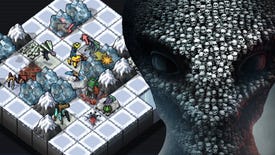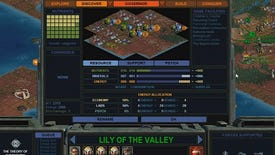The Rally Point: Why Alpha Centauri kind of helped when I had a breakdown
A staple for the nerves
I had, shall we say, a bad experience some years ago. Several days of lying in a darkened room eating cold party leftovers were to be expected. The amount of comfort I got from playing Alpha Centauri throughout, though, was a surprise.
It's less about mere familiarity than you'd think, given how late I first played it. Sid Meier’s Alpha Centauri By Sid Meier endures partly because its design has aged well, but mostly because it's an unusually human 4X strategy. Its high concept story asks for interpretation, for a philosophical response. Where so many others are about the arbitrary icons of nationalism, or stock elves/insectoids/robots, it's a game about ideology and personality. Where a sequel to Civilization's "send a colony ship into space" ending could have asked "what if lasers and aliens", Alpha Centauri instead asked: Where is humanity going?
Earth is gone, uninhabitable thanks to centuries of human exploitation and war. A UN ark launches to Alpha Centauri, but Things Go Wrong. Seven factions form, and each commandeers an escape pod to land on the nearby Planet and begin the traditional 4X processes.
Seven factions, only and always seven. Planet, always Planet. Even the secular and cynical call it Planet, and discuss it with some hint of reverence. Everyone has a notion of how humanity should relate to its new home, and each feels sincere. Even Morgan, the prick reviving capitalism in space, dreams of plenty, speaking of the human drive to trade and gather, not just raw grubby grifting. Yang's horrifying ulta-communism warps taoism and stoicism to dehumanise his captive population but even he believes in a greater vision for humanity as macro-organism, not just the vanity of statues and obeisance. Lal exhibits a bureaucratic pluralism, either the most wishy-washy nothing centrism or the most realistic recognition of humanity's innate tendency to veer from any norm. The seven factions of its expansion are more outlandish but they too invite opinion, with even the aliens hinting that the universe-scale greater good might mean self-annihilation.
Much of this characterisation comes across in the quotes that accompany every research discovery, from diaries, in-world books, and PR statements, a system many 4Xeses have copied since without ever nailing anything as rich as "Beware of he who would deny you access to information, for in his heart he dreams himself your master". If it's not already a case study for how excellent writing can become excellent narrative design, it damn well should be.
It lets you choose who to play, and who to befriend or oppose based on whose vibe you like, and makes those relationships more personal. Planet itself is a character of sorts. It's immediately hostile to humans, requiring gas masks, domes, and intense terraforming just to get a foothold. The native life is a sinister pink fungus, home to mind worms who overpower your units with terror. This opens up psionic warfare, gives the game room for more powerful external threats even in the late game than the unlikely "barbarians spotted near Milton Keynes", and complicates your relationship with Planet. Planet is, you learn, a living thing itself, its ecosystem forming a macro-organism with a life cycle that your development is threatening. Not just mining and pollution, but your very presence is a threat.

To exacerbate this, terraforming isn't limited to the typical mines/farms/roads, but its 3D modelling allows you to raise mountains, manufacture rivers, manipulate the local climate and even, with the right inter-faction vote, raise or lower the oceans. The land inevitably changes as everyone spreads, ugly browns and pinks turning to the greens of farm and forest, each representing more damage even as it makes things more fit for humans. The best mines are huge boreholes that I often fail to use even when I've built a special project to unlock them early, because they look like such deep, invasive scars. Teeming with horrifying monsters as Planet is, I'm the invader here. What right do I have, really?
Humans have, of course, far more advanced technology on the new planet. Consequently, formerly lategame things like aircraft come out relatively early, as do "planet buster" missiles, whose very name discourages their use in the light of Planet's rising sentience. Using one is visibly monstrous, gouging huge craters in the land and triggering a cascade of hostile mind worms even before you consider the diplomatic consequences.
Its diplomatic model is less advanced today, since the available deals and trades are limited. Co-operation is partly the usual expedience of defence against a stronger rival, or trade being more desired than an immediate war. But it's also a matter of shared ideals. Each faction's core ideology has some obvious clash with others, but also room for common ground, facilitated by a social engineering system. These determine which empire-wide bonuses and penalties you favour, but they're also a major manifestation of what you value as a society. You could choose a police state for the security benefits, but now you're a fucking police state and some factions will hate you. Some factions are barred from specific engineering choices, but most can compromise to serve some short term goal or placate an edgy neighbour. Commit certain atrocities and some will fight you to the death, however hopeless, but some (most interestingly Santiago, leader of the Spartans) know when they're beaten.


Most unusually, even today, is how helpful allies can be. Truly aligned friends will actively aid you. I've had several games where my armies defended allied colonies while their leaders showered me with free technology without prompting, or I bankrolled an industrial power as they bombed our enemies. It encourages less gamey thinking. In my latest game, the socialist revolutionary Free Drones lagged hopelessly behind, and as my only contiguous neighbour would have been an easy conquest before the coming war with two other nascent superpowers who refused my alliances (excellently, the then-allied leader of the Pirates had asked me for 500 credits, and when I said I could only send 250, told me not to bother at all). But I gave them my entire research bank instead, bought, improved, and then gave their weakest colony back. Why? Well, grateful allies are more useful than subjects, but moreover... I'm the Data Angels, whose whole thing isn't "information wants to be free"; it's "make sure you free it in the coolest way possible". I can't crush the socialist workers. They're good lads. And what happened? They came to reinforce me when the Pirates inevitably turned on us.
I later lost their loyalty by choosing social engineering choices they distrusted (because they were necessary to win a defensive war, you ungrateful pinko jerks!). It had me picturing the propaganda my late 90s hackers would have flooded them with to discredit their leader. Of course none of that is modelled, but everything in Alpha Centauri communicates that Planet is bigger than what you see. When talking to leaders, a corner panel cycles archive pictures. One has pictures of her as a baby hooked up to monitors, x-rays, a 3D brain image, her playing lacrosse, and a team picture. Its story is told in a handful of ominous paragraphs every few hours, always the same but of varying meaning to each faction. It's limited use of voice acting remains among my favourites. Not technobabble but thoughts and ruminations in a variety of soft-spoken tones that match a soundscape of gently ambient music.
Alpha Centauri is kinda ugly, and its units all look the same, but its modular unit design system is remarkably flexible once it gets off the ground. Rather than unchanging riflemen vs tanks vs you still have pikemen lmao, the unit type is defined by a chassis (infantry, hovertank, jeep etc.) onto which you bolt a weapon and armour... and later some special perk or two. Double morale, or anti-air weapons, or boarding vessels. The possibilities are vast, but creating a new one means building an expensive prototype (except the Spartans, an underrated bonus that reflects their martial adaptability) so can't be unleashed overnight.

The whole game is like that really: a strong design extraordinarily balanced between complexity and comprehensibility, and I haven't even got into how you can screw with your neighbour's climate, or bully and bribe the UN council to enact policies that favour you. Because it's the vibe that really marks it out today. I could recommend it as very sturdy design with loads of interesting details once you're over the deposit, but especially because it uses that model to explore ideas, to be about things, to advance the genre in a way I still haven't seen since.
Civilisation's most optimistic ending abdicates responsibility for earth. It's a race, an indulgence of imperialism, manifest destiny, linear and unidirectional "progress". Most 4Xs are still a zero sum contest, where whatever the victory condition, you win by proving yourself the best by virtue of your innate Egyptian-ness, Zuluness or Chineseness. Its most famous bit of character design, Gandhi's nuclear obsession, is a myth.
Alpha Centauri is about ideology, about who is right. And sure, mechanically it's the same race, but it feel different. Everything is contextualised to stimulate the imagination not visually, but philosophically. It's not about nationality but about principles, even if you bend those principles in service of their goal. It's about science fiction not as raw technology, but about the future of humanity culturally and psychologically. Strategy games are not within my capacity when I’m at my most fragile, but Alpha Centauri brings me comfort by offering hope and vision, something almost entirely absent in modern Britain. That comfort is why I drift back to it during those times, and ultimately why it's still the best 4X ever made.













